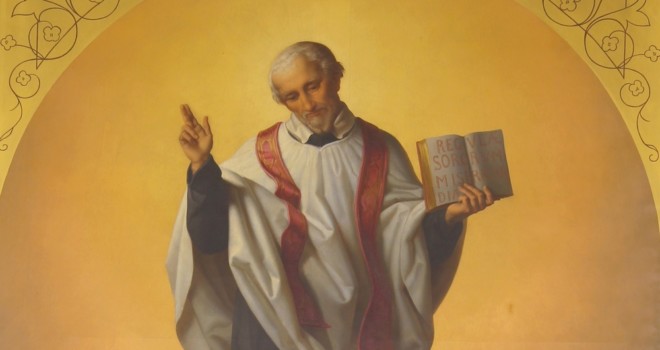The Church celebrates the Feast of St. Vincent de Paul on September 27th. St. Vincent is well known for his charitable works and service to the poor, but he was also a reformer of the priesthood and seminaries throughout France. Many of his reforms helped pave the way for the seminary system of our own day.
The priesthood was largely in ruins during the 17th century in
France. Many priests did not receive proper formation or abandoned the
requirements of the priesthood altogether. Many of the scandals the Church
faces today were occurring during St. Vincent’s time, including corruption,
violations of the requirement of celibacy, and greed. The Fallen nature of
human beings has always been on display in all vocations within the Church. It
is in times of great corruption and abandonment of the Faith that Christ raises
up saints to help bring about renewal. St. Vincent de Paul was one of those
saints to help restore the priesthood in his own day.
St. Vincent sought to educate both priests and members of the
laity on the role of the priesthood. A clear understanding of the priesthood is
also essential for priests, religious, and the laity today. With continued
scandals coming to light around the world, it is apparent that too many priests
have lost their way. There is also a great misunderstanding among many members
of the laity as to the actual nature and mission of the priesthood. St. Vincent
de Paul’s teachings on the priesthood can help us come to a deeper
understanding of God’s calling for priests and the need for renewal in the
priesthood today.
The priest as instrument
St. Vincent sought to renew the priesthood in France through
retreats that were open to both clergy and laity. His community worked in
seminaries in order to help with the formation of future priests. He needed to
address the issues in the formation of priests both in seminaries and with
current priests in order to improve the quality of priests serving the Church
in France. He taught on the nature of the common priesthood of all the baptized
and the ministerial priesthood reserved for those men who have received Holy
Orders. St. Vincent saw ministerial priests as God’s “instruments”.
“God has sent out priests as he sent his son for the salvation of souls.” “We are used for this like instruments through which the Son of God continues throughout all time to do from heaven what he has done during his life on earth.”
This “instrument” of Jesus Christ is by no means inert, interchangeable, irresponsible. It is an instrument chosen by the Lord and intended by him to be intelligent, free, responsible. And Vincent was to stress that “priests are irreplaceable in their role with the souls to whom God has given them.”
He becomes more explicit: “We have been chosen by God as instruments of his boundless charity which to establish it in hearts and with it to dilate souls… Our vocation therefore is to enflame the hearts of men, to do what the Son of God has done, he who came to cast fire on the earth…. It is true then that I have been sent not only to love God but to procure that he be loved. It is not enough that I love God if my neighbour does not also love him.”
Facelina, Raymond C.M. (2000) “The Mission and Vocation of the Priest According to St. Vincent de Paul,” Vincentiana: Vol. 44 : No. 3 , Article 4.
The priesthood can never be about the priest himself. It must
always be a movement of love outwards from him towards others. The great love
God has shown each individual priest by calling him to Holy Orders is so that
Christ’s work may be carried out here on earth. The priest is called through
pastoral charity to draw souls into the love of the Most Holy Trinity. This is
impossible to do if the priest caves in on himself and becomes focused on
worldly power, lust, greed, and honor. When priests turn away from Christ in
significant ways, the harm done is widespread.
The docility of the priest
The priest surrendering himself as an instrument in God’s hands can only be achieved through a docility of heart born of obedience to God and to his bishop. The priest is to image Christ in His kenosis to the Father. Christ pours Himself out in complete love and obedience to the Father. This is why obedience is an indispensable aspect of the priestly vocation. To be obedient is to be an image of Christ because of His unfailing obedience to the Father in all that He did in His earthly life. This kenosis is most clearly articulated in the Garden of Gethsemane and ultimately on the Cross when He pours Himself out in love to the Father for our salvation.
Fr. Facelina explains more of St. Vincent’s teaching:
“The condition required for being an instrument of Jesus Christ? To put oneself, like Christ, into the hand of God, to be intimately united with him in the course of pastoral action. This docility in order to remain constant needs to be kept disciplined relentlessly and daily at Mass. Through the celebration of the Eucharist and communion we are located at the heart of the Covenant with the Lord who was obedient unto death through love of us and for our salvation.
Without this docility, without this obedience, the priest fails in his mission which is to “make” the Eucharistic Body of Christ by the consecration, and the Mystical Body by animation.
Priestly spirituality and sanctification result from these two inseparable aspects. So much so that according to St. Vincent the way to priestly sanctity, and the example they must follow, is not so much Christ Evangeliser of the Poor but Christ the Priest. Priests must be conformed to him, imitating his religious attitude towards his Father and his charity towards people.”
Even though St. Vincent de Paul worked tirelessly in service to
the poor, he understood that the priesthood is not an arm of social work. This
is a mistake that we see in the Church at times. The priesthood’s central role
is in the celebration of the Mass through proclaiming the Word of God and
making present the Eucharist. If the priest becomes divorced from his role as
victim-priest united to the Eternal-Victim Priest then his ministry will
quickly suffer and he will become separated from his center as a priest. It is
through the Holy Eucharist that a tangible encounter with Christ is made
present to the people of God and to the world. This encounter, which is above
all else, an encounter of love, makes service to the poor and evangelization
possible.
St. Vincent de Paul is a saint for our times. His work to reform the priesthood in his own day is needed today when so much scandal and corruption is coming to light within the hierarchy. The priesthood is not about fulfilling the needs of the individual priest. It is about the continuation of God’s plan of salvation and His great love for souls. The priest is God’s instrument who surrenders himself in order to make the Holy Eucharist present to the People of God. The priest’s heart should be one of docility, charity, surrender, and obedience. St. Vincent’s understanding of the priesthood is an antidote to some of what ails the priesthood today.












